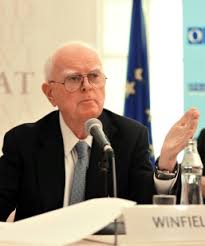
Richard Winfield, a co-founder of the International Senior Lawyers Project, created the Media Law Working Group as an extension of his work at Clifford Chance LLP. As both of counsel at Clifford Chance and a volunteer, Winfield has dedicated his career to reforming media laws and defending journalists prosecuted by regimes that would silence them.
Although there are certainly “more financially desirable callings,” Winfield maintains that nearly every lawyer who crosses the threshold into media law tends to stick with it because of the moral imperative, the engaging interactions with journalists, and the “good, nerdy fun” of it all. He leads a team of three or four dozen volunteers in the ISLP Media Law Working Group, and maintains that ISLP’s success is owed to the “enthusiasm and the skills of the lawyers that we deploy on these assignments.” Every case he takes on is invariably interesting, controversial, and challenging, but the challenge does not lie in the legal issue itself. Ordinarily, these are not difficult legal issues; rather, they are difficult because of the impunity of oligarchs and the danger that any
|
dissident faces. The real test, Winfield explains, is the integrity and impartiality of the judge, who may be threatened with removal if their decision begins with the word “not.”
In these cases, working on site can be particularly complicated in terms of diplomacy and danger. Winfield recalled a 2017 case in Istanbul in which a pair of brother journalists were on trial for sedition, terrorism, and sending subliminal messages in their televised critique of the Erdogan government, which aired the day before a failed coup. Winfield attended their trial and watched as the brothers were charged, convicted, and sentenced to life in prison. In the aftermath, he wrote an article denouncing the shortcomings of the justice process, earning himself the status of “persona non grata” in Turkey.
Richard Winfield and the Media Law Working Group also participate in trials and appeals remotely by filing amicus curiae briefs in the European Court of Human Rights, the Inter-American Court of Human Rights, and domestic courts. This “homegrown” legal activism can often have a substantial impact on the outcome of a case. Winfield cited a moving ISLP case involving journalists who obtained a document created by Russian officials that criticized a corrupt national court in their neighborhood. As the document was not confidential, the journalists published it verbatim. The officials brought a defamation suit against them and won both in the local court and intermediate appeals court, but the journalists took the case to the European Court of Human Rights, claiming that the Russian courts had violated their rights of freedom of expression. Winfield and the Media Law Working Group stepped in and wrote an amicus brief in support of the journalists, compiling the norms and laws of democracies that protect journalists who publish non-confidential reports of official government proceedings and citing these norms as a standard of press freedom. The European Court of Human Rights quoted the ISLP brief in their decision, in which they created new law and found that Russia had violated the rights of the journalists. Not long thereafter, the Russian Supreme Court also adopted this law protecting journalists.
Despite his successes for press freedom, Winfield noted, with some concern, a new global wave of repression through censoring and punishing journalists, which he calls the “Media Dark Ages.” As part of the universal playbook of autocracies, many leaders are installing media blackouts, threatening journalists and their loved ones, taking advantage of economic disparities between themselves and reporters, and sowing general distrust in the media, courts, and lawyers. Obstructing the flow of information in this way enables governments to act freely and without accountability, and ultimately leads journalists to censor themselves. Self-censorship is perhaps the most fickle and challenging beast to face in the media law landscape, because it is psychological, difficult to measure, and difficult to expel. In a self-censoring world, no one knows what they are missing, what scandals remain unexposed, or what corruption is allowed to fester unchecked.
Even with the high level of division and distrust that currently pervades American politics, Winfield remains hopeful. “Fundamentally, I’m an optimist, and the lawyers that we work with are optimists at heart. There’s an interview with Ruth Bader Ginsburg at the Museum of the City of New York, when she was an undergraduate in the 50s, in the time of Senator Joseph McCarthy, and she said, ‘We survived that patch.’” American history, Winfield went on to say, has been a series of rough patches, but it is “the values, the strength, and the institutions, not excluding the media,” that enables us to move forward. “You need that kind of optimism in this era,” he concluded.
